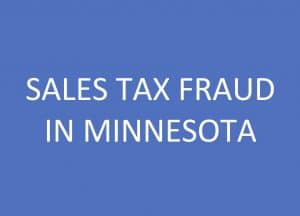Sales Tax Fraud in Minnesota
Sales tax fraud in Minnesota is not merely an issue for large corporations, it also affects small businesses and individuals alike. In fact, it is often a bigger issue for small businesses that do not have the safeguards and compliance in place to ensure proper reporting. The two most common pitfalls for sales tax are underreporting / underpaying the amount of sales tax owed to the Minnesota Department of Revenue; and failing to report or pay sales tax at all.
Reporting Requirements
When do you have to file sales tax returns and pay sales tax to the Minnesota Department of Revenue? As a general rule of thumb, if you are running a business, you likely have to file sales tax returns and pay sales tax to Minnesota, unless your business is exempt from sales tax, such as a law firm or other service. Further, there are certain items sold that are exempt by law and shipping and delivering products to customers outside of Minnesota are generally not subject to Minnesota sales tax.
Additionally, depending on how much sales tax you collect will determine when you must file with the Minnesota Department of Revenue. The filing is only yearly for those receiving less than $100 per month. Quarterly filing for those receiving between $100 and $500 per month; and monthly for those collecting more than $500 per month.
Sales Tax Fraud Examples
Most small businesses that run afoul of sales tax laws do so by fudging their numbers. Instead of reporting and paying the required percentage, they may report and pay a lesser percentage. Or, they could decide not to file or pay at all. In either scenario, the risk is gross misdemeanor or felony charges. For every missed filing and payment, it can be another charge, which can rack up quickly in a short amount of time.
The main difference between gross misdemeanor and felony charges for sales tax fraud is willfulness. If you knowingly fail to file or pay sales tax, then it is a gross misdemeanor. If you willfully do so, it is a felony. What is the difference between knowing and willful? It probably depends on the prosecutor charging the case out. My guess is they go with willful and a felony. A more technical answer is probably for those who idly stand by in the knowing context and for the active participants it is likely willful activity. For those submitting fraudulent returns altogether, it is a felony.
If you have been contacted by the Minnesota Department Revenue about failing to pay sales tax or fraudulently doing so, contact us by phone or text at 612-547-3199 or by email: ambroselegal@icloud.com.
Robert H. Ambrose is a criminal defense lawyer and fraud defense attorney in Minnesota. Super Lawyers named him Super Lawyer the past two years and a Rising Star the previous six years. He is an adjunct professor at the University of Minnesota Law School. Fraud Defense Attorney Minneapolis MN, Criminal Defense Lawyer Minneapolis MN, Criminal Lawyer Minnesota.

